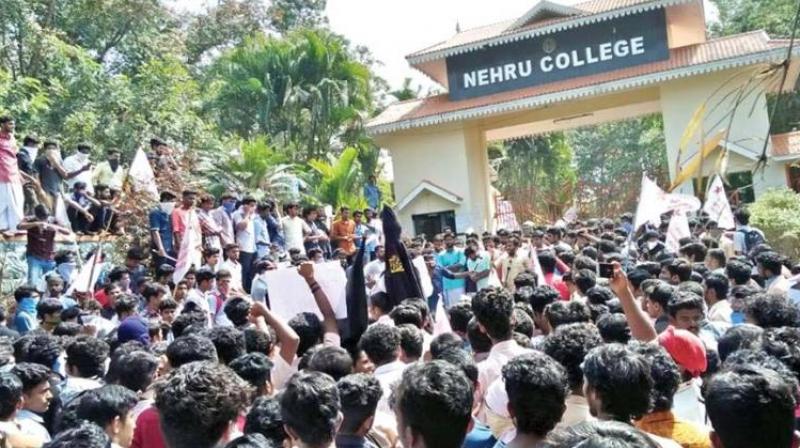Latest News
Taking Video of An Act Done Publicly Will Not Violate Privacy: Kerala HC Quashes Charges Against Students Alleged to Have Posted Videos of Teacher Online.

In the case arising out of recent ongoing controversies following the death of JishnuPranoy, a student of Nehru College of Engineering, Pampadi. Kerala High Court held that “when one complains into the right of transgression into the privacy, it presupposes the existence of a private act or an act which was within the notice of public. When an act is done openly in the presence of other persons, it is doubtful whether the publication of that may constitute an offence.”
In the instant case, a charge sheet was filled against ten students by a female professor alleging defamation and mental agony under Section 119(b) of the Kerala Police Act and Section 294(b) of the Indian Penal Code. The suicide of Jishnu subsequently followed protests by students within college premises, concerning to which the said professor directed protesting students to remove banners erected by them, refusal to which she volunteered herself in removing banners. The act of professor removing protest banners was captured in mobile cameras by some student and posted on social media. Accordingly, FIR was registered and charge-sheet was filed, alleging commission of aforementioned offences.
Section 119(b) of the Kerala Police Act envisages that taking photographs or records or videos of and propagate them at any place in a manner affecting reasonable privacy of a woman is an offence. Pertaining to which learned counsel for petitioner contented that the language of the provision is absolutely vague and the term “reasonable privacy” was not adequately defined therefore it is nebulous in nature. By dint of it, police authorities was given wide power to initiate criminal proceedings.
Justice Thomas formulating single benchdid not fathom into the contention raised by petitioner’s counsel as the aspect of constitutionality of the provision was not challenged. However, he made note of the judgment of Supreme Court in Shreya Singhal v. Union of Indiain which it was held that vague laws offend several important values. The Supreme Court in the Shreya Singhal case relying on the judgmentKartar Singh V. State of Punjab [(1194) 3 SCC 569] held that vague laws may trap the innocent by not providing fair warning. Consequently, in the absence of a clear definition as to what is meant by a transgression into the privacy of a person, the conduct of the petitioner cannot ex post facto be brought within the campus of offending a statutory provision.
Section 294(b) IPC contemplates punishment for anyone sings, recites or utters any obscene song, ballad or words, in or near any public place, shall be punished with imprisonment of either description for a term which may extend to three months, or with fine, or with both. With regard to the application of the said provision to the instant case Justice Thomas further relying on the judgment of Latheef V. State of Kerala (2014 (2) KLT 987) held that Section 294(b) of Indian Penal Code was not sustainable against the petitioners. Mere utterance of abusive words will not constitute offence of uttering obscene words under Section 294(b). For that, the words uttered should have a sexual or lascivious connotation. The complaint had no allegation that the students had uttered such words. In Lateef’s case Kerala High Court has held that to attract offence under Section 294(b), the act alleged must have a sexual content or must have a lascivious element involved. The Judge further stated that even by remote stretch of imagination it cannot be extended in the instant case.
Court has further dealt the case withan another angle and quashed the allegation against students with the assertion that “the acts which were video graphed were openly done, in public view of others. Therefore, there cannot be an offence of invasion of privacy by video graphing and publication of such acts”.
The court further stated that “the acts video graphed and published were the acts which were done by her in open, in the college ground, and in the presence of several other persons, as is discernible from the complaint itself. Necessarily, when one complains into the right of transgression into the privacy, it presupposes the existence of a private act or an act which was within the notice of public. When an act is done openly in the presence of other persons, it is doubtful whether the publication of that may constitute an offence.”



































































































